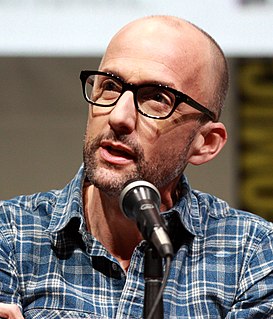A Quote by Ernest Cline
I've heard Stephen King say that when you write a novel you end up revealing everything about yourself.
Quote Topics
Related Quotes
It's disingenous for me to say that I wasn't trying to write a moral novel. By its very nature as a novel about the Iraq War, Fobbit steps into the political conversation. There's no way to avoid that. I can appreciate that readers are probably going to line up on one side of the novel or the other. I hope they go to those polar extremes, actually.
Stephen King writes mass fiction but gets reviewed by the New York Times and writes for the New Yorker. Critics say to me, "Shut up and enjoy your money," and I think, OK, I'll shut up and enjoy my money, but why does Stephen King get to enjoy his money and get reviewed on the cover of the New York Times Sunday Book Review?
The age of the book is not over. No way... But maybe the age of some books is over. People say to me sometimes 'Steve, are you ever going to write a straight novel, a serious novel' and by that they mean a novel about college professors who are having impotence problems or something like that. And I have to say those things just don't interest me. Why? I don't know. But it took me about twenty years to get over that question, and not be kind of ashamed about what I do, of the books I write.
The first time I ever met Stephen King, he came up to me, and we went to shake hands, and he had, like, this fake rubber rat that he kind of, you know, shook at me. You know, and I said, 'No, this is a cliche - this can't be. Stephen King is trying to scare me with a fake rat?' It was just really weird.
I think it was in sixth grade, though, when I picked up my first Stephen King book, which was 'It,' that knocked me over and terrified me for years. Then I never went back. I had to own every Stephen King book and read them at least three times. They would terrify me completely, but I couldn't stop. That became my preferred source of fiction.






































